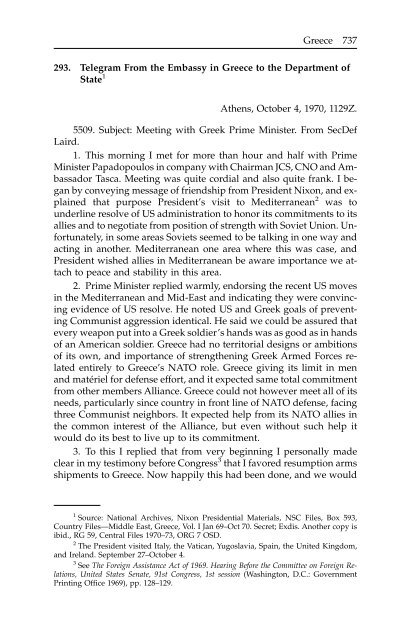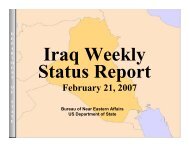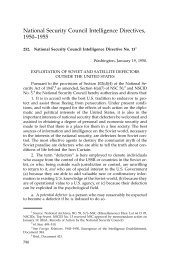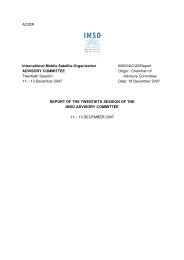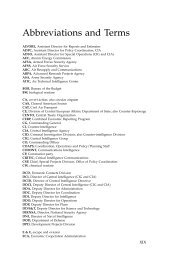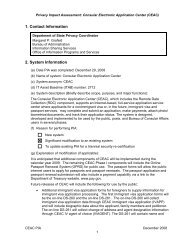Greece - US Department of State
Greece - US Department of State
Greece - US Department of State
Create successful ePaper yourself
Turn your PDF publications into a flip-book with our unique Google optimized e-Paper software.
<strong>Greece</strong> 737<br />
293. Telegram From the Embassy in <strong>Greece</strong> to the <strong>Department</strong> <strong>of</strong><br />
<strong>State</strong> 1<br />
Athens, October 4, 1970, 1129Z.<br />
5509. Subject: Meeting with Greek Prime Minister. From SecDef<br />
Laird.<br />
1. This morning I met for more than hour and half with Prime<br />
Minister Papadopoulos in company with Chairman JCS, CNO and Ambassador<br />
Tasca. Meeting was quite cordial and also quite frank. I began<br />
by conveying message <strong>of</strong> friendship from President Nixon, and explained<br />
that purpose President’s visit to Mediterranean 2 was to<br />
underline resolve <strong>of</strong> <strong>US</strong> administration to honor its commitments to its<br />
allies and to negotiate from position <strong>of</strong> strength with Soviet Union. Unfortunately,<br />
in some areas Soviets seemed to be talking in one way and<br />
acting in another. Mediterranean one area where this was case, and<br />
President wished allies in Mediterranean be aware importance we attach<br />
to peace and stability in this area.<br />
2. Prime Minister replied warmly, endorsing the recent <strong>US</strong> moves<br />
in the Mediterranean and Mid-East and indicating they were convincing<br />
evidence <strong>of</strong> <strong>US</strong> resolve. He noted <strong>US</strong> and Greek goals <strong>of</strong> preventing<br />
Communist aggression identical. He said we could be assured that<br />
every weapon put into a Greek soldier’s hands was as good as in hands<br />
<strong>of</strong> an American soldier. <strong>Greece</strong> had no territorial designs or ambitions<br />
<strong>of</strong> its own, and importance <strong>of</strong> strengthening Greek Armed Forces related<br />
entirely to <strong>Greece</strong>’s NATO role. <strong>Greece</strong> giving its limit in men<br />
and matériel for defense effort, and it expected same total commitment<br />
from other members Alliance. <strong>Greece</strong> could not however meet all <strong>of</strong> its<br />
needs, particularly since country in front line <strong>of</strong> NATO defense, facing<br />
three Communist neighbors. It expected help from its NATO allies in<br />
the common interest <strong>of</strong> the Alliance, but even without such help it<br />
would do its best to live up to its commitment.<br />
3. To this I replied that from very beginning I personally made<br />
clear in my testimony before Congress 3 that I favored resumption arms<br />
shipments to <strong>Greece</strong>. Now happily this had been done, and we would<br />
1 Source: National Archives, Nixon Presidential Materials, NSC Files, Box 593,<br />
Country Files—Middle East, <strong>Greece</strong>, Vol. I Jan 69–Oct 70. Secret; Exdis. Another copy is<br />
ibid., RG 59, Central Files 1970–73, ORG 7 OSD.<br />
2 The President visited Italy, the Vatican, Yugoslavia, Spain, the United Kingdom,<br />
and Ireland. September 27–October 4.<br />
3 See The Foreign Assistance Act <strong>of</strong> 1969. Hearing Before the Committee on Foreign Relations,<br />
United <strong>State</strong>s Senate, 91st Congress, 1st session (Washington, D.C.: Government<br />
Printing Office 1969), pp. 128–129.


